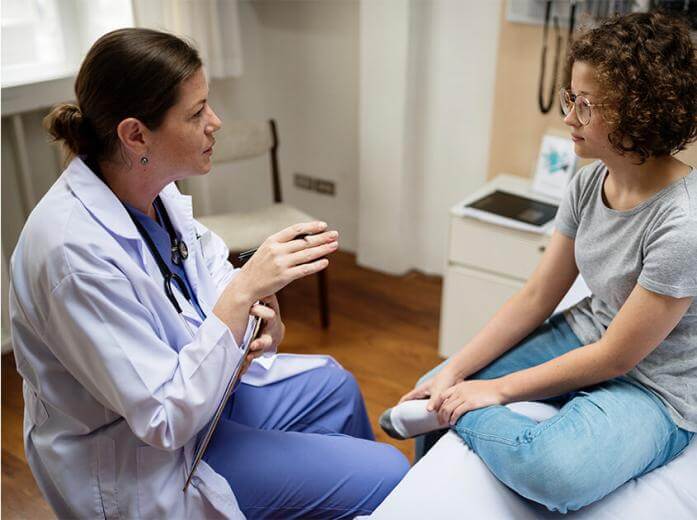Women’s History Month is a time to reflect on the honor and service of women in the military. For generations, women paved the way for those who followed. We celebrate those gains as more women serve today than ever before.
It’s also a month to celebrate the important work women do every day. Dr. Yael Nillni, a researcher with VA’s National Center for PTSD, devotes her career to improving the lives of other women. Her work centers around understanding how trauma and PTSD affect both civilian and Veteran women.
PTSD affects many areas of a woman’s life, including relationships, work, sleep and even reproductive health. Dr. Nillni’s research aims to understand the ways that trauma and PTSD impact women in their childbearing years, and especially during and right after pregnancy. Her research helps women get better care for PTSD during pregnancy, which benefits their families too.
What do we know about PTSD and women’s reproductive health?
PTSD can affect a woman’s reproductive health in several ways. For example, women with symptoms of depression and PTSD may take longer to get pregnant. And once pregnant, PTSD is associated with pre-term births and low birth weight babies. After pregnancy, PTSD is associated with an increased risk for bonding issues between mother and child, including postpartum depression.
Women Veterans report more trauma and PTSD than civilian women, so they may be at higher risk for these negative birth outcomes. Dr. Nillni’s work has shown that women Veterans with higher levels of PTSD symptoms were more likely to experience negative pregnancy outcomes. Examples include gestational diabetes, preeclampsia and preterm birth, as well as postpartum mental health symptoms.
Is help for PTSD available?
Help is available. Dr. Nillni’s message for anyone dealing with PTSD is simple: “We have good treatments for PTSD, VA can help, and it’s never too late to start working on your mental health.”
Evidence-based treatments for PTSD are effective before, during or after pregnancy. There is no reason to believe that trauma-focused psychotherapies – talk therapies where you focus on the trauma you experienced or its meaning – are unsafe while pregnant. Cognitive Processing Therapy (CPT), Prolonged Exposure (PE), Written Exposure Therapy (WET) and Eye Movement Desensitization and Reprocessing (EMDR) are all effective options. There are medication treatment options too. Women should discuss the risks and benefits associated with medication treatment during pregnancy with a mental health provider and their obstetrician (OB-GYN). Dr. Nillni urges women with PTSD to “get the PTSD treatments that are recommended. You don’t have to get a different kind of treatment just because you’re pregnant.”
Dr. Nillni encourages women to talk with their doctor, especially their (OBGYN), about their mental health symptoms. Doctors caring for a pregnancy can help coordinate with mental health professionals if they are aware of these symptoms. VA also offers maternity care coordination services to help women Veterans navigate health care services both inside and outside of VA.
When should I get help?
Women’s History Month is a great time to reach out to the women in your life or to focus on your own self-care. If you or a woman you know is experiencing symptoms of PTSD, don’t wait to get help. PTSD treatment can improve your health and well-being before you get pregnant. Getting treatment while you’re pregnant can improve your birth and postpartum outcomes. Treatment during the postpartum period can help you during this time of transition.
PTSD treatment can benefit a woman at any stage in her life, and it’s never too early or too late to get started.
What other resources are available?
National Center for PTSD: Resources and information on trauma, PTSD and treatment options.
Women Veterans Call Center: Connecting women Veterans, their families and caregivers with VA services and resources.
Women Veterans Program Managers: Advises and advocates for women Veterans. Program Managers can help to coordinate all the services women Veterans may need. If you are currently pregnant, ask about VA Maternity Care Coordinators.
Self-help Mobile Apps: Free, private and secure mobile apps that provide self-help information and support.
Peggy Willoughby is the director of communications for VA’s National Center for PTSD.
Topics in this story
More Stories
The 2024 National Veteran Suicide Prevention Annual Report provides the foundation for VA’s suicide prevention programs and initiatives.
Theranostics is a specialized field of nuclear medicine that uses a two-pronged approach to diagnose and treat cancer.
Air Force Veteran Shireta Jones overcomes obstacles with support from VA and adaptive devices to continue her passion for pickleball.







I am very interested in If there is a correlation between PTSD and miscarriages. I have PTSD and now I haven’t had a full term pregnancy yet. 3 miscarriages this year and using IVF. No genetic or physical reasons found. I was starting to think it may stem from my time I’m service.
Thank you, Dr. Nillini. Is there existing research about miscarriage in the military?
Thank- you Dr Nillini for your research. Would like to see if you’ve done any research into the physical affects of women with PTSD & Menopause?